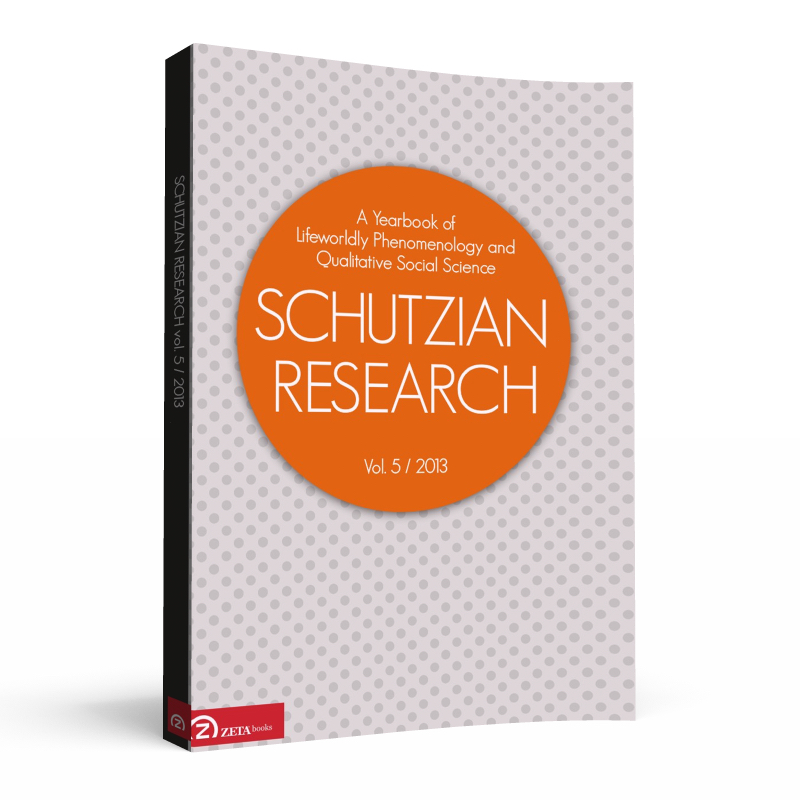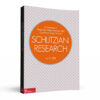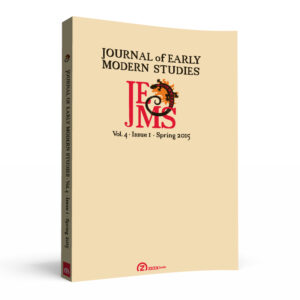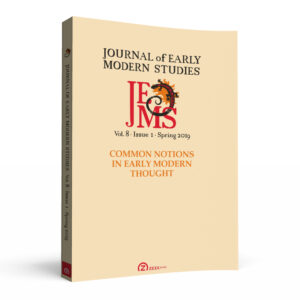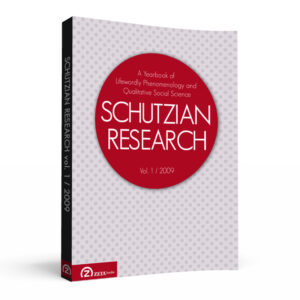Table of Contents
MICHAEL BARBER: Introduction
ALFRED SCHUTZ: Fragment of a Phenomenology of Rhythm Transcription, edition and translation by Gerd Sebald and Jasmin Schreyer. Introduction by Gerd Sebald: Remarks on Alfred Schutz’s “Fragment on the Phenomenology of Rhythm”
- Abstract: The present paper gives an introduction to Schutz’s hereafter first published [“Fragment on the Phenomenology of Rhythm”]. After the editorial remarks the connections to the first part (first published in 1976) are developed along the lines of a nonconceptual substructure of meaning, the problem of passive synthesis, the phenomenological concept of the ideal object, the problem of the unit, and finally the connection of body, mind, and space. The paper closes with a commented summarization of Schutz’s fragment.
MATTEO BONOTTI: Integrating Strangers into the Mainstream Society: A Phenomenological Perspective
- Abstract: In this paper, I argue that participation in face-to-face social groups can make a crucial contribution to the inclusion of strangers into the social life of liberal democratic polities. First, I critically assess Alfred Schutz’s (1964) phenomenological analysis of “Th e Stranger” within the context of his overall conception of the “life-world.” I then argue that linguistic communication can only enable a partial integration of strangers into an alien group. Th is is due, I claim, to what Schutz calls the “irreversibility of inner time,” i.e., the meta-structure of temporality which prevents outsiders from fully internalizing the structures of an alien life-world. Nevertheless, I conclude that strangers can join small groups and associations and, by participating in face-to-face relationships and activities, integrate into the common life of these groups. Thanks to a pre-communicative interaction with the other members of these groups, strangers can grasp those more intangible elements of the groups’ cultural background which cannot be rationalized and communicated through language. Participation in the social activities of face-to-face groups provides strangers with a starting point for gradually integrating into the mainstream society.
JOACHIM RENN and LINDA NELL: Acts & Events-Alfred Schutz and the Phenomenological Contribution to the Theory of Interaction
- Abstract: The following article deals with Alfred Schutz’s contribution to the theory of action and interaction by pointing out the possibly most compelling phenomenological starting position, i.e, the decomposition of the unity of an action. Th e article stresses that Schutz’s methodical interpretive sociology in this sense has always refused the assimilation of action-events to material occurrences. In contrast to empiricist theories of action which wrongly substantialize action events by treating them as material events, the phenomenological account gives reason to the assumption that there must be a systematic gap between at least two subjective estimations of the meaning of action. In other words, the introspective analysis of the subjective constitution of meaning means to take the problem of double contingency seriously. Phenomenology, for its temporal and conceptual resolution, seems much more appropriate to reconstruct the complex structures of “presence,” “identity,” and “intersubjectivity” than empiricist accounts. Th e article proposes in the end the need for an alternative concept of presence: Instead of confusing levels of cooperation with allegedly “objective” synchronicity, phenomenology reminds us to elaborate an alternative concept of simultaneity, i.e, a simultaneity on the level of performativity and tacit knowledge. Th e latter could be the warrantor for co-reference.
KSENIYA DMYTRENKO: Nachfolge der transzendentalen und mundanen Phänomenologie als Voraussetzung empirisch phänomenologischer Forschung
- Abstract: In the background of accelerated interdisciplinary development of phenomenology, there appears more clearly a deficiency of the epistemological grounding and methodological explanation of present research. Th is is particularly evident in the fi eld of social phenomenology, in which the research positions extend from that of the “orthodox” transcendental phenomenologists to an endless search for a new foundation for pragmatic social phenomenology in philosophical anthropology, to a vague thesis about “fruitful discussion” between E. Husserl and A. Schutz. Th e main task of this article consists in the establishment of the fundamental significance of the epistemological succession between Husserl’s transcendental phenomenology and Schutz’s natural phenomenology. Th is confirms itself through the analysis of such concepts as sense and constitution, which play the prominent methodological role in the main works – Ideas-I and correspondingly Th e Phenomenology of the Social World. Such comparative analysis allows not only to highlight the most important similarities in the projects of both thinkers such as a “sense-giving function” of consciousness, but also to distinguish small deviations of the mundane phenomenology from the transcendental project, i.e., the rejection of transcendental reductions and the “pragmatic conditioning” of the subjective action’s sense through now- and so-states of the ego. It is proposed to interpret the famous Schutzian “turning away from Husserl” first of all as a skeptical turn; however, that does not mean that the essential transcendental prerequisites such as a correlation of “attitude – experience – world” should be abandoned. In the end, it is demonstrated that the main metaphysical statements of Husserl can still retain their value within the framework of the contemporary conventional research models such as the “scientific research program” by I. Lakatos, whereas further theoretical statements, i.e., of social phenomenology, can be bound with this “hard core” as “auxiliary hypotheses” in cooperation with empirical sciences.
CARLOS BELVEDERE: What is Schutzian Phenomenology? Outlining the Program of Social Phenomenology
- Abstract: My aim is to depict Schutzian phenomenology as a whole. In order to do so, I will start by presenting Schutz’s ideas on the phenomenological, egological, and eidetic reductions as mere technical devices. Th en I will show how they are interconnected with phenomenological psychology. After that, I will argue that phenomenological psychology leads to worldly phenomenology and I will explore its consequences for transcendental philosophy and the empirical sciences. I will conclude with some reflections on naturalized phenomenology and how it finds absolute certainty in the life-world, not in the transcendental realm.
THOMAS EBERLE: Regaining Sense-connections after Cerebral Hemorrhage
- Abstract: This study is a kind of applied phenomenology, or more precisely, of applied phenomenological hermeneutics. I argue that phenomenologists hardly analyze concrete phenomena but prefer to engage in theoretical debates, and therefore I call for more applied studies. Th e case of a patient who suffered a cerebral hemorrhage is used in order to reconstruct how she slowly regained everyday sense connexions. Th e case is very interesting as the patient was rather disoriented when waking up from an artificial coma of several weeks, and it took her many years to fully recover. Th e goal of this paper is to describe some aspects of this process from a subjective perspective as well as from a participant observer’s viewpoint. Th e data used for this chapter mainly stem from in-depth qualitative interviews. Th e structures of the life-world of Alfred Schutz are used to analyze the processes of sense constitution. Th is proves helpful but the data also suggest a revision of Schutz’s analyses in some respects.
JOCHEN DREHER: Reflections on a Phenomenology of Power
- Abstract: A frequent accusation directed at phenomenology and phenomenologically oriented sociology is that of power oblivion. Edmund Husserl’s phenomenology is accused of not considering the social conditions of the possibility of the doxic experience of the world, and Alfred Schutz’s social phenomenology is blamed for neglecting the social structural preconditions of the experience of everyday reality. Based on this criticism, it is argued that the objectively given power structures, which influence the subjective experience, are not considered in Schutz’s social phenomenological reflections. Bourdieu proclaims that the experience of the social world as being self-evident, as “taken for granted” in Schutz’s words, is taken into consideration without a reference to social conditions such as hierarchies of power. I will reject this reproach by demonstrating the specific potential of Schutz’s theory of the life-world and especially his theory of relevance to conceptualize the phenomenon of power with reference to the subjectivity of the individual actor. Th e theory of life-world off ers a conceptual scheme with a specific capacity to capture theoretically the interrelation of subjective constitution and objective construction of power.
Book Discussion : Hisashi Nasu and Frances Chaput Waksler (ed.), Interaction and Everyday Life: Phenomenological and Ethnomethodological. Essays in Honor of George Psathas (Lanham Maryland: Lexington Books, 2012)
- JONATHAN WENDER: Phenomenological Sociology as an Intellectual Movement
- CARLOS BELEVEDERE: On George Psathas and Phenomenological Sociology
- DOUGLAS MACBETH: Ethnomethodological Explorations
ISSN: 2067-0621 (paperback)
ISSN: 2248-1907 (electronic)
ISSN: 2248-1907 (electronic)
ISBN: 978-606-8266-66-4 (paperback)
ISBN: 978-606-8266-67-1 (ebook)
ISBN: 978-606-8266-67-1 (ebook)

